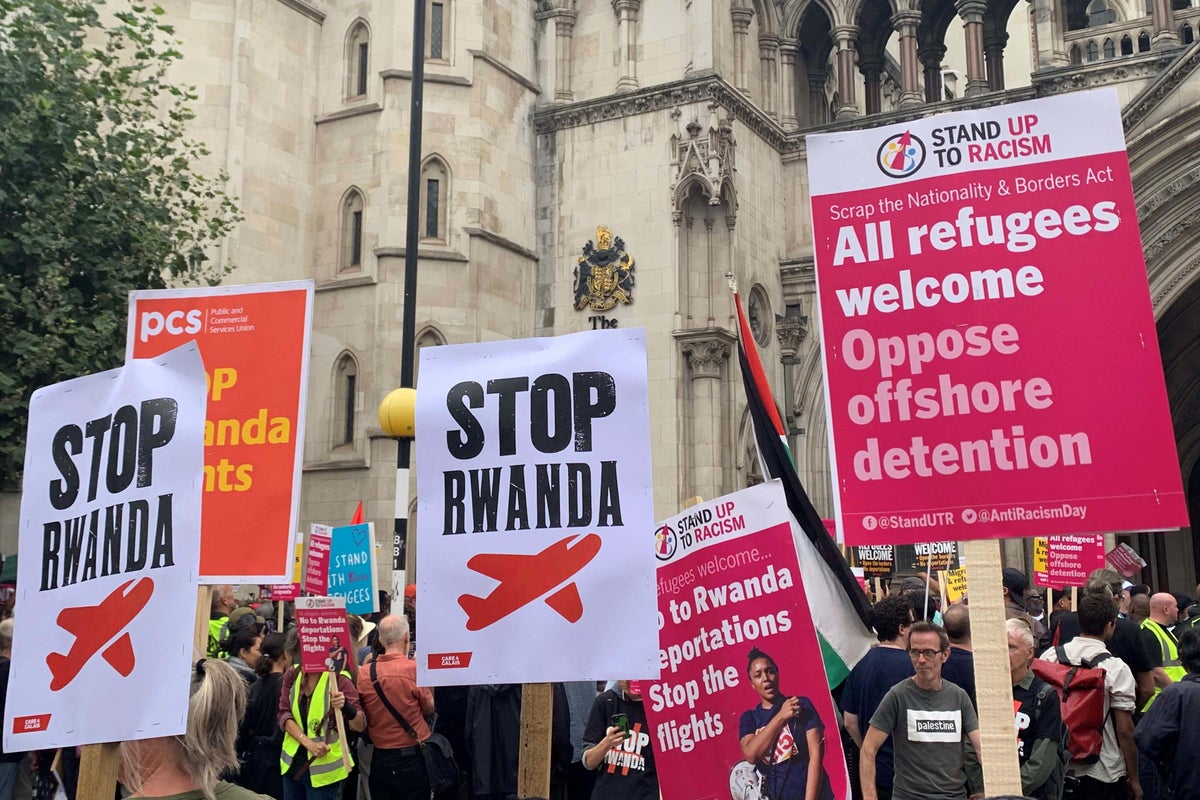
The government has spent at least £1.3m fighting legal battles over the Rwanda migration deal and admits the figure will rise further.
Immigration minister Robert Jenrick said the figure was the cost of “defending the partnership in the High Court as of March”, and was separate from the £140m so far paid to Paul Kagame’s government to process UK asylum cases.
A letter to parliament’s Home Affairs Committee added: “This relates to the judicial review and over a hundred different cases which have been brought forward by individual claimants and groups.
“As legal cases are ongoing and final spend cannot yet be determined, further costs may be released in due course.”
The calculations were done before the latest stage of the legal battle against the scheme, which would see asylum seekers and modern slaves forcibly deported to Rwanda because they arrived in Britain on small boats, hit the Court of Appeal in April.
The Care4Calais charity, which was part of the original legal challenge, said the government should stop spending public money on the “ineffective” scheme and fund alternatives to Channel crossings.
Chief executive Steve Smith MBE added: “It’s time the government stopped spending hundreds of millions of pounds on human suffering, ditched their ineffective ‘deterrents’ and instead invested in a compassionate asylum system.”
Liberal Democrat home affairs spokesperson Alistair Carmichael said the costs “just keep on piling on”.
“There's now no denying that this policy is unworkable, inhumane and incredibly expensive for the taxpayer,” he added.
“The home secretary needs to finally accept reality – which means scrapping the Rwanda scheme now and focusing instead on tackling the asylum backlog created by years of Conservative incompetence.”
It comes after The Independent revealed the high cost of the government’s wider asylum policies, including a £1.6bn contract for the operator of barges and other accommodation, and separate funding for police forces, ports, private contractors, councils and health bodies.
Suella Braverman expanded the Rwanda deal in March, after failing to formally disclose her years of work training government lawyers in the country.
Braverman signs the agreement that will see Rwanda process the UK’s asylum claims— (PA)
The Rwanda plan, along with new laws aiming to see all small boat migrants detained and deported, are part of Rishi Sunak’s pledge to stop Channel crossings.
The prime minister previously admitted that no flights to Kigali would leave until legal challenges had been resolved, and Ms Braverman told MPs last week that the outcome was one of “many unknown factors upon which [our plan’s] success is contingent”.
Former home secretary Priti Patel made a rare ministerial direction to force the Rwanda policy through in April 2022, after the Home Office permanent secretary found its “high cost” could only be justified if it was “effective as a deterrent”.
“Evidence of a deterrent effect is highly uncertain and cannot be quantified with sufficient certainty to provide me with the necessary level of assurance over value for money,” Matthew Rycroft wrote.
Small boat crossings in the English Channel subsequently soared to a new record for 2022 and are currently running slightly below last year’s levels – despite Mr Sunak claiming a crackdown was working,
In his letter to the Home Affairs Committee, Mr Jenrick said: “We have always been clear that we expect the deterrent effect of the Migration and Economic Development Partnership to materialise once relocations begin.
“Initial uncertainty is to be expected with a partnership as innovative and groundbreaking as this.
Home Secretary Suella Braverman tours a building site on the outskirts of Kigali during her visit to Rwanda in March— (PA)
“However, it stands to reason that for those willing to pay smuggling gangs thousands of pounds to facilitate a dangerous, unnecessary and illegal journey to the UK, the probability of relocation to Rwanda at the end of that journey will prove a deterrent and therefore reduce costs to the asylum system overall.”
A date has not yet been set for the Court of Appeal’s ruling on whether the High Court was wrong to declare the Rwanda deal lawful, and the case could be taken further to the Supreme Court.
Lawyers representing asylum seekers selected for deportation told the Court of Appeal Rwanda is “an authoritarian one-party state”, which “imprisons, tortures and murders those it considers its opponents”.
They argued there was a risk that asylum seekers would be denied proper process after being deported, and that judges had previously shown “excessive deference” to promises made by the Rwandan government that were not backed up by evidence.
The court heard that the Home Office breached several legal duties in deciding that Rwanda was a safe country to receive refugees, and failed to properly investigate the outcome of a similar deal with Israel that saw asylum seekers disappear and die.







